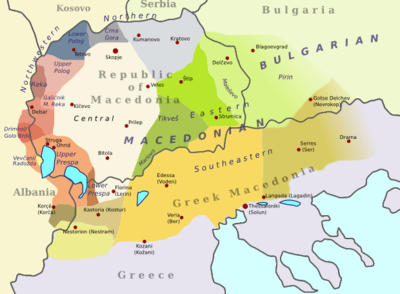Maleševo-Pirin dialect

 |
Audio samples of the Maleševo-Pirin dialect
About the activist Ǵorǵi Pop Stojanov's struggle against the Ottomans
Excerpt from speech by a man from the Maleševo region |
| Problems playing these files? See media help. | |
The term Maleševo-Pirin dialect (also spelt Maleshevo) is used in South Slavic linguistics to refer to a group of related varieties that are spoken on both sides of the border of Bulgaria and the Republic of Macedonia. Some linguists treat them as dialects of the Bulgarian language,[1][2][3] while Victor Friedman views them as part of the Macedonian language.[4] According to some authors, they are linguistically transitional between the two national languages, Bulgarian and Macedonian and form part of the larger dialect continuum between them. The dialect group is named after the mountain ranges of Pirin in Bulgaria and Maleševo in Macedonia. When referring specifically to the dialects on the Bulgarian side, the term Petrich-Blagoevgrad dialect, after the two major towns in the area, is also used.[5][6]
Some Macedonian linguists tend to treat the whole group as part of the Macedonian language, classifying it as part of a southeastern group of Macedonian dialects; others, like Krume Kepeski do not classify it as part of Macedonian,[7] whereas from the perspective of Bulgarian linguistics, the varieties in Bulgaria are classified as parts of the eastern subgroup of the southwestern group of Bulgarian.[5] This dialect is spoken in the towns of Delčevo, Pehčevo, Berovo and the surrounding villages in the east of the Republic of Macedonia, and in the regions of Blagoevgrad, Petrich and Sandanski in Bulgaria.[8]
The Blagoevgrad-Petric dialect is also closely related to the neighbouring Kyustendil and Samokov dialects, and especially to the Dupnitsa dialect,[8] whereas the Maleshevo dialect is closely related especially with the Štip-Strumica dialect.[9]
Linguistic properties
The following is a table of distinctive phonological and grammatical features, comparing the values found in the Maleshevo and Blagoevgrad-Petrich dialects with Standard Bulgarian, Standard Macedonian and two neighbouring Western Bulgarian dialect areas.
| ||||||||||||||||||||||||||||||||||||||||||||||||||||||||||||||||||||||||||||||||||||||||||||||||||||||||||||||||
As shown by the table, the Maleshevo and the Blagoevgrad-Petrich dialect show mixed Bulgarian and Macedonian phonological traits and mostly Bulgarian grammatical traits (several instead of one conjugation, single definite article, formation of past perfect tense with бeх, etc.), with the Maleshevo dialect ranging mostly towards Macedonian and the Blagoevgrad-Petrich dialect ranging mostly towards Bulgarian (cf. table). The transitional nature of the dialect is further demonstrated by the reflexes of the Proto-Slavic *tʲ/*dʲ: from the typically Bulgarian щ/жд (ʃt/ʒd) in the Blagoevgrad-Petrich dialect and the far East of the Maleshevo dialect, along the border with Bulgaria, through the transitional шч/жџ (ʃtʃ//dʒ/) in the central parts, and to the typically Macedonian ќ/ѓ (c/ɟ) in the western parts of the Maleshevo dialect[8]
Other phonological characteristics
- shortening of words
- use of the plural suffix -ove as in Bulgarian instead of -ovi as in Macedonian: клучове ('keys')
- use of the old consonant group caf- instead of the consonant group cv-: цев- цаф (cev, 'pipe')
- use of /v/ at the beginning of the word as in Bulgarian instead of /j/ as in Macedonian: важе ('rope')[9]
Morphological characteristics
- use of the preposition sus/sos: – сус/сос рака ('with the hand');
- the clitic possessive forms follow the verb: му рече – рече му ('He told him');
- use of the dative form with na: на нас ни рече ( na nas ni reche, 'He told us')
- the form of the verb to be for third person plural is sa as in Bulgarian, instead of se as in Macedonian: тие се – тие/тия са ('those are'), они са ('they are')
- use of the pronouns on, ona, ono, oni instead of toj, tja, to, te[9]
References
- ↑ Стойков, Стойко. Българска диалектология, София 2002, с. 170-186
- ↑ Селищев, Афанасий. Избранные труды, Москва 1968, с. 580-582
- ↑ Mladenov, Stefan. Geschichte der bulgarischen Sprache, Berlin-Leipzig, 1929, § 213
- ↑ V. Friedman, "Macedonian", in: B. Comrie and G. Corbett (eds.), The Slavonic Languages, New York: Routledge
- 1 2 Sussex, Roland; Paul Cubberley (2006). The Slavic Languages. Cambridge University Press. p. 510. ISBN 0-521-22315-6.
- ↑ Стойков, Стойко (2006). Българска диалектология. Акад. изд. "Проф. Марин Дринов".
- ↑ Кепески, Круме – "Македонска граматика", Државно книгоиздателство на Македонија, Скопје, 1946, page 7
- 1 2 3 Стойков, Стойко (2006). Българска диалектология. Акад. изд. "Проф. Марин Дринов".
- 1 2 3 The sociolinguistics of literary Macedonian, VICTOR A. FRIEDMAN, THE UNIVERSITY OF CHICAGO LIBRARY